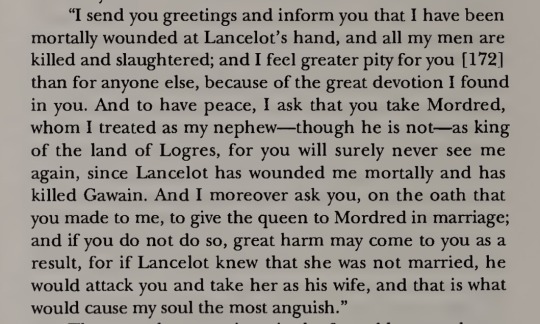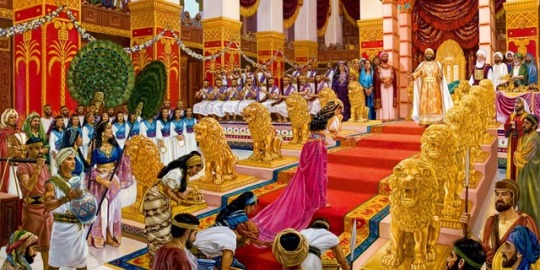#and then in the Post-Vulgate it’s just kind of quickly said that he also loved Guinevere this whole time and wanted to marry her
Text
Okay there’s like a whole post I wanna make on Mordred and Guinevere but I was reading Mordred’s usurpation in the Vulgate and I forgot how funny Mordred’s fake Arthur letter is

“Yes I am Arthur and I am currently dying. You should definitely make Mordred king. Because I will be dead. Also he should totally marry Guinevere. It is very important that he marry Guinevere.”
Like I know that was Mordred’s first draft and he was just really banking that none of the Barons would ask questions (and they didn’t so I guess he was right).
#I want to make a post about Mordred’s pursuit of Guinevere in the Vulgate#and how it is like technically divorced from his claim to the throne here#like marrying Guinevere is something he tacks on for his own love for her not in an effort to gain legitimacy as king#and then in the Post-Vulgate it’s just kind of quickly said that he also loved Guinevere this whole time and wanted to marry her#and by Le Morte there’s not really a reason given for the attempted marriage#and the way the few modern interpretations that even use it seem to view it as a political choice instead of the personal one it was#but also this letter is so funny I see why all the other version jsut say there was a letter instead of actually writing it#Mordred#Guinevere#Arthuriana#vulgate cycle#mordred x Guinevere
116 notes
·
View notes
Photo

Book of Wisdom - From The Latin Vulgate - Chapter 5
INTRODUCTION.
This book is so called, because it treats of the excellence of Wisdom, the means to obtain it, and the happy fruits it produces. It is written in the person of Solomon, and contains his sentiments. But it is uncertain who was the writer. It abounds with instructions and exhortations to kings and magistrates to administer justice in the commonwealth, teaching all kinds of virtues under the general names of justice and wisdom. It contains also many prophecies of Christ's coming, passion, resurrection, and other Christian mysteries. The whole may be divided into three parts: [1.] In the six first chapters, the author admonishes all superiors to love and exercise justice and wisdom. [2.] In the next three, he teacheth that wisdom proceedeth only from God, and is procured by prayer, and a good life. [3.] In the other ten chapters, he sheweth the excellent effects, and utility of wisdom and justice. (Challoner)
Chapter 5
The fruitless repentance of the wicked in another world: the reward of the just.
1 Then shall the just stand with great constancy against those that have afflicted them, and taken away their labours.
Notes & Commentary:
Ver. 1. Then. At the day of judgment. The just and the reprobate know each other's condition, Luke xvi. 20. --- Labours. Defrauding them of their wages, (Leviticus xix. 13.) or plundering them. Septuagint, "despised, (Calmet) or frustrated his labours." (Haydock) --- Worldlings deride those who strive to obtain the goods of eternity, (Calmet) and think they labour in vain. (Worthington)
2 These seeing it, shall be troubled with terrible fear, and shall be amazed at the suddenness of their unexpected salvation,
Ver. 2. No explanation given.
3 Saying within themselves, repenting, and groaning for anguish of spirit: These are they, whom we had sometime in derision, and for a parable of reproach.
Ver. 3. Within. Or among themselves. --- Repenting. In despair. --- Reproach. We diverted ourselves with turning them to ridicule. (Calmet) --- This change of sentiment (Haydock) proceeds not from the love of virtue, and is useless. (Worthington)
4 We fools esteemed their life madness, and their end without honour.
Ver. 4. No explanation given.
5 Behold, how they are numbered among the children of God, and their lot is among the saints.
Ver. 5. God. As they styled themselves truly, through the merits of Christ, chap. ii. 18.
6 Therefore we have erred from the way of truth, and the light of justice hath not shined unto us, and the sun of understanding hath not risen upon us.
Ver. 6. Understanding in not in the Roman (Calmet) or the Alexandrian copy [of the Septuagint]. (Haydock) --- Some read "of justice," Ephesians v. 11. (Calmet)
7 We wearied ourselves in the way of iniquity and destruction, and have walked through hard ways, but the way of the Lord we have not known.
Ver. 7. No explanation given.
8 What hath pride profited us? or what advantage hath the boasting of riches brought us?
Ver. 8. No explanation given.
9 All those things are passed away like a shadow, and like a post that runneth on,
Ver. 9. Post. Septuagint, "fame." ---
Fama malum quo non aliud velocius ullum
Mobilitate viget, viresque acquirit eundo. (Virgil, Æneid iv.)
10 And as a ship, that passeth through the waves: whereof when it is gone by, the trace cannot be found, nor the path of its keel in the waters:
Ver. 10. No explanation given.
11 Or as when a bird flieth through the air, of the passage of which no mark can be found, but only the sound of the wings beating the light air, and parting it by the force of her flight: she moved her wings, and hath flown through, and there is no mark found afterwards of her way:
Ver. 11. No explanation given.
12 Or as when an arrow is shot at a mark, the divided air quickly cometh together again, so that the passage thereof is not known:
Ver. 12. No explanation given.
13 So we also being born, forthwith ceased to be: and have been able to shew no mark of virtue: but are consumed in our wickedness.
Ver. 13. Virtue. How quickly passes the life of man, (Proverbs xxx. 18.) and how few leave behind them a good reputation! Many of those whose actions are recorded in history, were falsely admired, (Calmet) and indeed the scourges of mankind. (Haydock)
14 Such things as these the sinners said in hell:
Ver. 14. Such, &c. This is not in the original; but supplied to complete the sense, (Calmet) as otherwise the following remarks would seem to be the confession of the damned in hell, (Haydock) or before the judgment-seat. (Castro.) --- The past time is used to shew the certainty of the event. (Worthington)
15 For the hope of the wicked is as dust, which is blown away with the wind, and as a thin froth which is dispersed by the storm: and a smoke that is scattered abroad by the wind: and as the remembrance of a guest of one day that passeth by.
Ver. 15. Dust. Septuagint, Psalm i. 4. Literally, "like the tender beard, (Haydock) or wool." Lanugo. (Calmet)
16 But the just shall live for evermore: and their reward is with the Lord, and the care of them with the Most High.
Ver. 16. Care. Literally, "thought." (Haydock) --- God thinks and provides for them.
17 Therefore shall they receive a kingdom of glory, and a crown of beauty at the hand of the Lord: for with his right hand he will cover them, and with his holy arm he will defend them.
Ver. 17. Crown. The Scripture thus represents the glory of the blessed, because there is nothing more desirable than independence. But the happiness of the elect will be to throw their crowns at the foot of God's throne, (Apocalypse vii. 10.; Calmet) in whom they find every advantage. (St. Augustine, ser. i. de vit. apost.)
18 And his zeal will take armour, and he will arm the creature for the revenge of his enemies.
Ver. 18. Armour. Septuagint, "he will take zeal, his complete armour." (Haydock) --- See Isaias lix. 17., and Ephesians vi. 16. (Calmet) --- The misery of the damned is unchangeable. (Worthington)
19 He will put on justice as a breastplate, and will take true judgment instead of a helmet:
Ver. 19. No explanation given.
20 He will take equity for an invincible shield:
Ver. 20. No explanation given.
21 And he will sharpen his severe wrath for a spear, and the whole world shall fight with him against the unwise.
Ver. 21. Unwise. "As we have sinned in all, we are wounded by every thing." (St. Gregory, hom. 25.; Ev.)
22 Then shafts of lightning shall go directly from the clouds, as from a bow well bent, they shall be shot out, and shall fly to the mark.
Ver. 22. Directly. Straight to the mark. (Menochius)
23 And thick hail shall be cast upon them from the stone-casting wrath: the water of the sea shall rage against them, and the rivers shall run together in a terrible manner.
Ver. 23. Casting. He alludes to the ballista, used to throw stones, Josue x. 11. These comparisons shew the power of God over all nature. (Calmet)
24 A mighty wind shall stand up against them, and as a whirlwind shall divide them: and their iniquity shall bring all the earth to a desert, and wickedness shall overthrow the thrones of the mighty.
Ver. 24. No explanation given.
0 notes